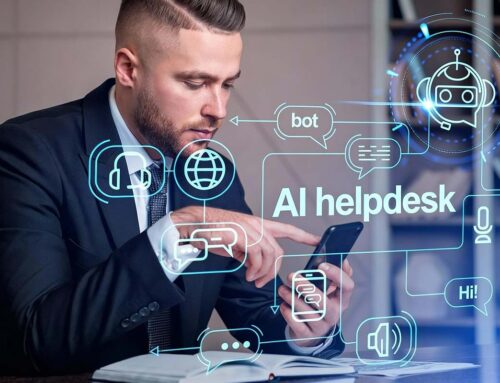
Microsoft Copilot vs. ChatGPT: Who Wins the AI Security War?
Today, two of the biggest names in artificial intelligence (AI) are Microsoft Copilot and ChatGPT. Both are making tsunami-sized waves across industries and sectors, including cybersecurity. Developers can use these tools to create cybersecurity scripting and policies to help keep corporate data safe. Given the 38% increase in global cybersecurity incidents in 2022, these tools couldn’t come at a better time.
However, there is a problem. When it comes to technology, every tool can also be a weapon. The Harvard Business Review describes the growing realization that AI solutions like ChatGPT can cause as much harm as good. They say, “Curiosity (about the software) quickly gave way to earnest concern around the tool’s potential to advance bad actors’ agendas.”
At the same time, both platforms offer extensive use cases around coding and documentation that could help cybersecurity teams increase their productivity. There is also Microsoft Copilot for Security, the generative AI module explicitly designed to help cybersecurity experts with incident response—and more.
So, in a head-to-head comparison of Microsoft Copilot vs. ChatGPT who will win the AI security war? Let’s explore the issues, risks and benefits of these powerful tools within the context of cybersecurity.
Microsoft Copilot vs. ChatGPT — Understanding the Differences
Microsoft tackles the Copilot vs. ChatGPT question on their website, stating:
ChatGPT and Microsoft Copilot are both artificial intelligence (AI) technologies that were developed with the intent of helping you accomplish tasks and activities faster and more efficiently. While they may seem similar, there are significant differences between the two.
You might imagine more similarities than differences between the code and learning datasets in these AIs because Microsoft played a role in developing both. However, both tools are very different. ChatGPT is a generative AI tool that focuses on human-like content generation. Microsoft wrapped its Copilot AI engine around its other tools, like Microsoft 365, OneDrive and SharePoint. Copilot functions like a personal assistant within the Microsoft universe, while ChatGPT is a stand-alone platform.
What is Microsoft Copilot?
Microsoft Copilot is an AI-powered code completion tool developed by GitHub (owned by Microsoft) in collaboration with OpenAI (49% owned by Microsoft). Copilot was launched in 2021, is available by subscription, and is still under development.
Behind the scenes, Microsoft Copilot leverages the power of GPT (Generative Pre-trained Transformer) technology to assist developers in writing code more efficiently. Copilot analyzes the context of the written programming and suggests relevant code snippets, function calls and even entire functions, which can speed up the development process significantly while elevating the work output of less experienced programmers.
Strengths of Microsoft Copilot:
- Code generation: Microsoft Copilot generates code snippets based on contextual understanding. It can significantly reduce development time by providing developers with accurate and relevant code suggestions.
- Integration with GitHub: As GitHub’s product, Copilot seamlessly integrates with the development workflow of millions of developers worldwide. This integration enhances collaboration and code quality within the development community.
- Continuous learning: Copilot learns from its interactions with developers, continuously improving its code suggestions and adapting to different programming styles and languages.
Limitations of Microsoft Copilot:
- Limited understanding: While Copilot demonstrates impressive contextual knowledge, it may still produce incorrect or insecure code suggestions, especially in complex, ambiguous contexts.
- Dependency on training data: Copilot’s effectiveness relies heavily on the quality and diversity of its training data. Biases in the training data could manifest in the generated code, potentially leading to security vulnerabilities.
What is ChatGPT?
ChatGPT is a variant of the GPT architecture developed by OpenAI specifically for conversational applications. Launched in 2022, the model has trained on vast amounts of text data from the internet and can generate human-like responses in natural language.
Strengths of ChatGPT:
- Natural language understanding: ChatGPT uses an AI algorithm called natural language processing (NLP), which gives it a remarkable ability to understand and generate human-like text. ChatGPT can engage in conversations on a wide range of topics and mimic the style and tone of human communication.
- Versatility: Unlike Microsoft Copilot, which is tailored for code generation, ChatGPT can be applied to various tasks, including customer support, content generation and language translation—and code generation.
- Extensibility: Developers can fine-tune and customize ChatGPT for specific applications and domains, allowing for greater flexibility in its usage.
Limitations of ChatGPT:
- Lack of contextual understanding: While ChatGPT can generate coherent responses, it may struggle with understanding the context of a conversation, leading to irrelevant or nonsensical outputs.
- Potential for misinformation: As with any AI-driven system, ChatGPT may generate misleading or false information, especially when presented with ambiguous or contentious topics.
Microsoft Copilot vs. ChatGPT Use Cases
ChatGPT is a powerful tool for content creation. Microsoft Copilot is a specialized code generator designed to support software development. Each AI tool serves a distinct purpose.
You can use ChatGPT to create:
- Conversations and dialogue
- Creative writing
- Answers to queries
- Language translations
- Customer support interactions
- Educational instruction
Microsoft Copilot works best as a:
- Coding assistant to help developers
- Code reviewer and debugger
- Technical documentation creator
- Training tool for new programmers
- Automation resource for repetitive coding tasks
Microsoft Copilot vs. ChatGPT and Cybersecurity

In 2023, Blackberry polled 1,500 IT and cybersecurity leaders and found that 51% predict a cyberattack stemming from ChatGPT code this year and 71% say nation-states are likely already using the tool maliciously. Given that Microsoft designed Copilot to generate code specifically for developers, the risks are high that anyone can use these platforms to launch an attack.
Several factors come into play when comparing Microsoft Copilot and ChatGPT in the context of cybersecurity.
Code Security and Vulnerabilities
- Microsoft Copilot: While Copilot can assist developers in writing code faster, there is a risk that it could create insecure code with vulnerabilities. Developers must carefully review and test the code suggested by Copilot to ensure it meets security standards.
- ChatGPT: Although not directly related to cybersecurity code, if manipulated by bad actors, ChatGPT could generate phishing messages, social engineering attacks or other malicious content.
Adversarial Attacks
- Both Copilot and ChatGPT are susceptible to adversarial attacks, where malicious actors manipulate inputs to generate undesirable outputs. Adversarial attacks could exploit vulnerabilities in code generated by Copilot or deceive users with misleading information from ChatGPT.
Privacy Concerns
- Copilot and ChatGPT raise privacy concerns regarding the data they process and generate. Developers and users must ensure sensitive information isn’t inadvertently leaked through code suggestions or conversational interactions.
Potential Applications
- Copilot could potentially help develop security-related software by generating code that adheres to security best practices.
- ChatGPT could assist in threat intelligence gathering, natural language processing-based security tasks or even in simulating social engineering attacks for security training purposes.
Developers and security professionals must be vigilant in understanding and mitigating the risks of using these AI-driven tools in security-critical contexts. At the same time, they can use these tools for good, potentially speeding up code generation and documentation.
Data Security in Microsoft Copilot vs. ChatGPT
There is also the obvious question: How safe are the platforms themselves? For example, Copilot can access sensitive data stored across an enterprise Microsoft ecosystem. Then there is ChatGPT, which saves the data you pour into it, potentially adding it to their learning database. These risks lead at least a dozen major companies to restrict platform access last year. The companies are worried about losing customer data and source code. To give OpenAI credit, the company now allows you to specify how ChatGPT uses your input data.
How have these two AI platforms addressed the sensitivity of the data they interact with?
Microsoft Copilot
- Data security: Copilot primarily operates within the development environment, analyzing code snippets and providing suggestions to developers. Since Copilot integrates with GitHub, it adheres to GitHub’s security protocols and data protection measures.
- Data usage: Copilot processes code snippets and improves based on the developers’ interactions. However, it does not store or retain sensitive code snippets or data developers use beyond the session context.
ChatGPT
- Data security: ChatGPT operates in conversational contexts, processing text inputs and generating responses. OpenAI, the developer of ChatGPT, implements stringent security measures to protect user data and ensure privacy.
- Data usage: ChatGPT’s data usage policies prioritize user privacy and data protection. Text inputs provided to ChatGPT for generating responses are processed transiently and not stored beyond the immediate interaction, minimizing the risk of data exposure.
In both cases, data security measures are in place to protect user privacy and prevent unauthorized access to sensitive information. However, users should always exercise caution when sharing potentially sensitive or confidential data, even within AI-driven systems, and adhere to the best data protection and privacy practices.
Winning the AI Security War: How Companies Can Protect Their Data When Using Copilot or ChatGPT
As companies increasingly integrate AI-driven tools like Microsoft Copilot and ChatGPT into their workflows, concerns about data security loom large. While these tools offer significant benefits in terms of productivity and efficiency, they also raise important considerations regarding protecting sensitive data. Here’s how companies can safeguard their data when leveraging Copilot or ChatGPT.
Data Encryption and Access Controls
Implementing robust encryption mechanisms to safeguard data in transit and at rest is a cybersecurity must-have. Ensure access controls are in place to restrict unauthorized access to sensitive data within the AI tools and associated platforms. By enforcing strict access policies, companies can prevent data breaches and the unauthorized use of proprietary information.
Data Minimization and Anonymization
Adopt a minimalistic approach, where employees can input only necessary data into AI tools like Copilot or ChatGPT. Additionally, consider anonymizing or pseudonymizing data before feeding it into these systems to reduce the risk of exposing personally identifiable information (PII) or sensitive corporate data.
Regular Security Audits and Compliance Checks
Conduct regular security audits and compliance checks to ensure the AI tools and associated infrastructure meet industry best practices and regulatory requirements. Regular assessments help identify and mitigate potential security vulnerabilities before malicious actors can exploit them.
User Training and Awareness
Provide comprehensive training to employees on data security best practices when using AI tools like Copilot or ChatGPT. Educate users about the importance of protecting sensitive data, recognizing potential security threats and adhering to company policies and procedures for data handling.
Vendor Security Assessments
Prioritize vendor security assessments when selecting AI tools or service providers. Evaluate the security measures implemented by the vendors to protect customer data, including data encryption, access controls and compliance with industry standards and regulations.
Secure Integration with Existing Systems
Ensure that the integration of Copilot or ChatGPT with existing systems and platforms follows secure coding practices and does not introduce vulnerabilities or weaken existing security controls. Conduct thorough testing to validate the integration’s security and address any identified issues promptly.
Incident Response and Data Breach Preparedness
Develop a robust incident response plan to address potential data breaches or security incidents involving AI tools. Establish clear procedures for detecting, containing and mitigating security threats and notifying affected parties and regulatory authorities in compliance with data protection laws.
Red River offers full-service cybersecurity support to prevent cybersecurity attacks proactively. We help enterprise organizations implement robust security protocols to help safeguard these companies when working with any third-party vendor, including Microsoft Copilot and ChatGPT. Talk with our team today about how we can help you win the AI security war.
Q&A
Does Copilot use ChatGPT?
No, Microsoft Copilot does not use ChatGPT. While both systems utilize AI, they are distinct and developed by different organizations. Copilot is a code completion tool developed by GitHub in collaboration with OpenAI, using a variant of the GPT model architecture. It assists developers in writing code more efficiently by generating contextually relevant code suggestions. ChatGPT, on the other hand, is developed by OpenAI specifically for natural language processing tasks, such as engaging in conversations and generating human-like text responses.
What is Microsoft Security Copilot?
Microsoft Copilot for Security is a new generative AI solution geared to help developers improve their cybersecurity footprint. The tool offers end-to-end IT security support in incidence response, threat hunting, intelligence and forensics and more. The AI integrates with other Microsoft cybersecurity products like Defender XDR.

written by
Corrin Jones
Corrin Jones is the Director of Digital Demand Generation. With over ten years of experience, she specializes in creating content and executing campaigns to drive growth and revenue. Connect with Corrin on LinkedIn.




